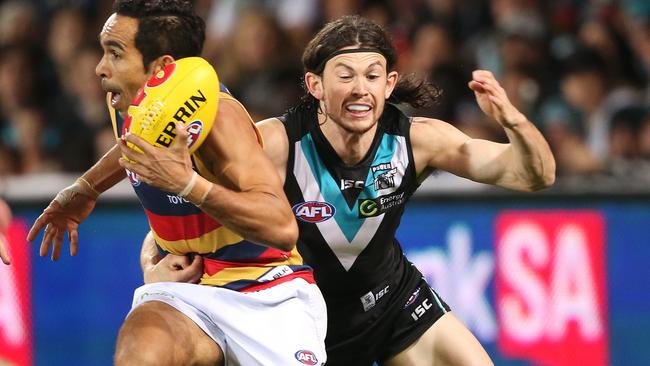Richard Evans: Throwing bananas at black sportsmen has been recognised as racism across Europe for decades
THROWING bananas at dark-skinned sportsmen is nothing new. Across Europe, it is instantly recognised as appalling racism, treating players as apes or monkeys, writes Richard Evans.
Opinion
Don't miss out on the headlines from Opinion. Followed categories will be added to My News.
HURLING a banana at a black soccer player was commonplace in England in the 1980s but has, thankfully, long been eradicated from its national game.
While it might not be happening in the UK so often now, the blatantly racist act — synonymous with treating players as apes or monkeys — endures elsewhere in European stadiums from Spain to Russia.
Team sport by its nature brings excitement, misery and passion, it’s part of the deal, your club counts. As we know, it also summons prejudice — unseen and unknowing at times, blatant at others.
The young woman on Saturday night came primed with a banana, not an apple or orange, as we know it. Maybe she just reached into her bag and grasped the first missile that came to hand and chucked it, badly. Or maybe not. It’s all still a bit unclear.

We’ve been here before. Adam Goodes recently. Nicky Winmar’s stand two decades ago.
We need to move forward, a lesson English football learned many years back.
Viv Anderson, in 1978, became the first black player to represent England. As a young Nottingham Forest substitute he was pelted with fruit one day and returned to his seat.
“Get your arse back out there then and fetch me two pears and a banana,” quipped manager Brian Clough.
“It was Cloughie’s way of having a bit of fun with a racist act,” Anderson later said.
“He pulled me over and said: ‘If you let people like that dictate to you, I’m going to pick somebody else, because you’re going to be worrying about what the fans will say’.”
Anderson will strike a chord with Eddie Betts.
Jamacian player John Barnes turned out 80 times for England and, as a key man of the great Liverpool team of the late ’80s, was the regular focal point of bananas launched from the terraces. Not to mention on-field abuse.
“Players called me n***** to my face. It happened in training, in matches. Any black player of my generation had it. In 1984 with England in Brazil, I had it with the National Front.
“There wasn’t a game in the 80s when you didn’t get racial abuse as a black player. I got racist abuse at Liverpool when I played for Watford. Then I played for Liverpool and didn’t get it.”
The sea change came through a lowly administrator with the Greater London Council, Herman Ouseley, who, in 1993, set up a project to tackle racism in football called Kick It Out. Making football free from discrimination was his aim.
It made a difference to the point that Ouseley is now Lord Ouseley. More importantly racism has been kicked, almost entirely, into touch from English football grounds.
There have been exceptions. Racist rancour from England captain John Terry four years ago and a spat between the deeply unpleasant Luis Suarez of Liverpool and Manchester Utd’s Patrice Evra are two examples.
“He called me a negro, he called my sister a prostitute,” was the gist of the latter incident. Suarez was banned for eight games.
But these are exceptions now.
Few English Premier League teams put out more than a handful of white, English players any more. The TV money pouring into the game has been a siren call for the very best players to come to England, regardless of country or colour.
Accordingly it’s difficult to be racist, as a combatant or a fan, when many of your team’s players are black. Team before colour in simple terms.
John Barnes turned to comedy as a weapon. Before the 1988 FA Cup final, the Australian and Liverpool FC footballer Craig Johnston penned ‘the Anfield Rap’, a woeful ditty designed to galvanise the club before its big day.
“I come from Jamaica, my name is John Barnes, When I do my thing the crowd go bananas,” rapped Barnes.
A small step, but he made his point.
It is 35 years since Paul Canoville became the first black footballer to play for Chelsea FC. As Canoville, a local man, warmed up, Chelsea supporters screamed: “Sit down, you black ****, we don’t want the n*****, we don’t want the n*****, la la la la.”
This is what it was, and it wasn’t that long ago. It just needs everyone, inside and outside sport, to buy in.
Let’s not be complacent. In 2010, FIFA announced the 2018 World Cup would be held in Russia, a country notorious for football unpleasantries.
The following year Brazilian legend Roberto Carlos had bananas and bile hurled at him while playing in the Russian Premier League.
Disgraced FIFA president Sepp Blatter followed this up a short time later by announcing football was free of racism. Get up and shake hands if there’s an incident was his simple advice.
Clearly it is a route the AFL is not prepared to follow.
The challenge, as Lord Ouseley knows, is much, much wider. Perhaps we could borrow him for a season or two.
Richard Evans wrote about football in the United Kingdom for more than two decades.


